Case Note: Halliday v Nevill - Trespass Law in Australia
VerifiedAdded on 2020/10/05
|15
|4674
|391
Report
AI Summary
This report provides a comprehensive case note analysis of the Australian legal case Halliday v Nevill, focusing on the complexities of trespass law. The report begins with an introduction to trespassing in Australia and then presents a detailed case note, summarizing the facts, procedural history, and the issues to be decided. It identifies the key legal principles, including common law and statutory authority, and implied permission. The analysis meticulously applies the law to the facts, examining the relevance of common law and statutory authority. The report discusses the application of trespass law, power of entry, and the concepts of expressed and implied permission. It further analyses the implications of the ruling on the power of police officers and the rights of individuals. The case note also analyzes the application of law to the facts of the case. Overall, the report offers a thorough examination of the case, its legal implications, and the court's final decision regarding trespass and the authority of law enforcement.
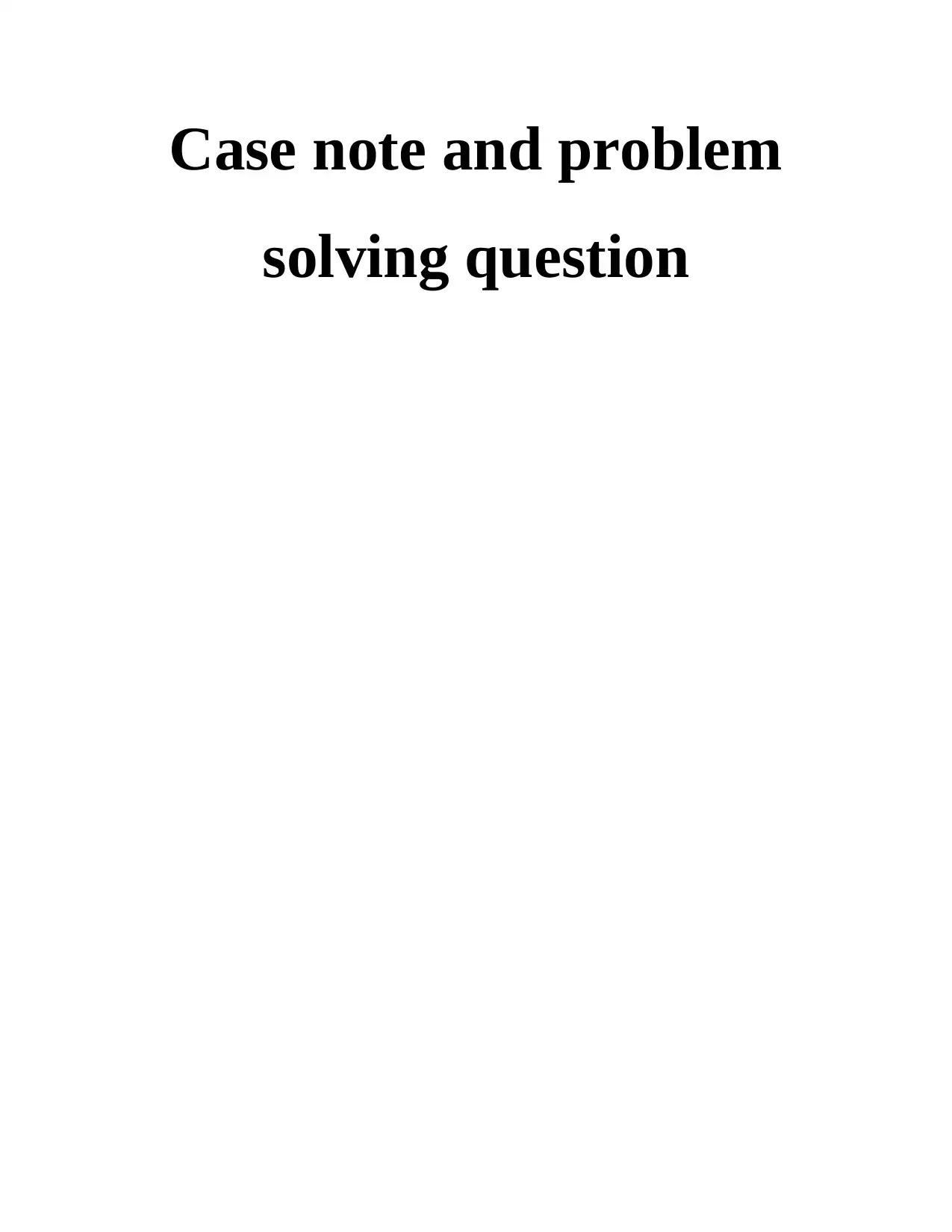
Case note and problem
solving question
solving question
Paraphrase This Document
Need a fresh take? Get an instant paraphrase of this document with our AI Paraphraser
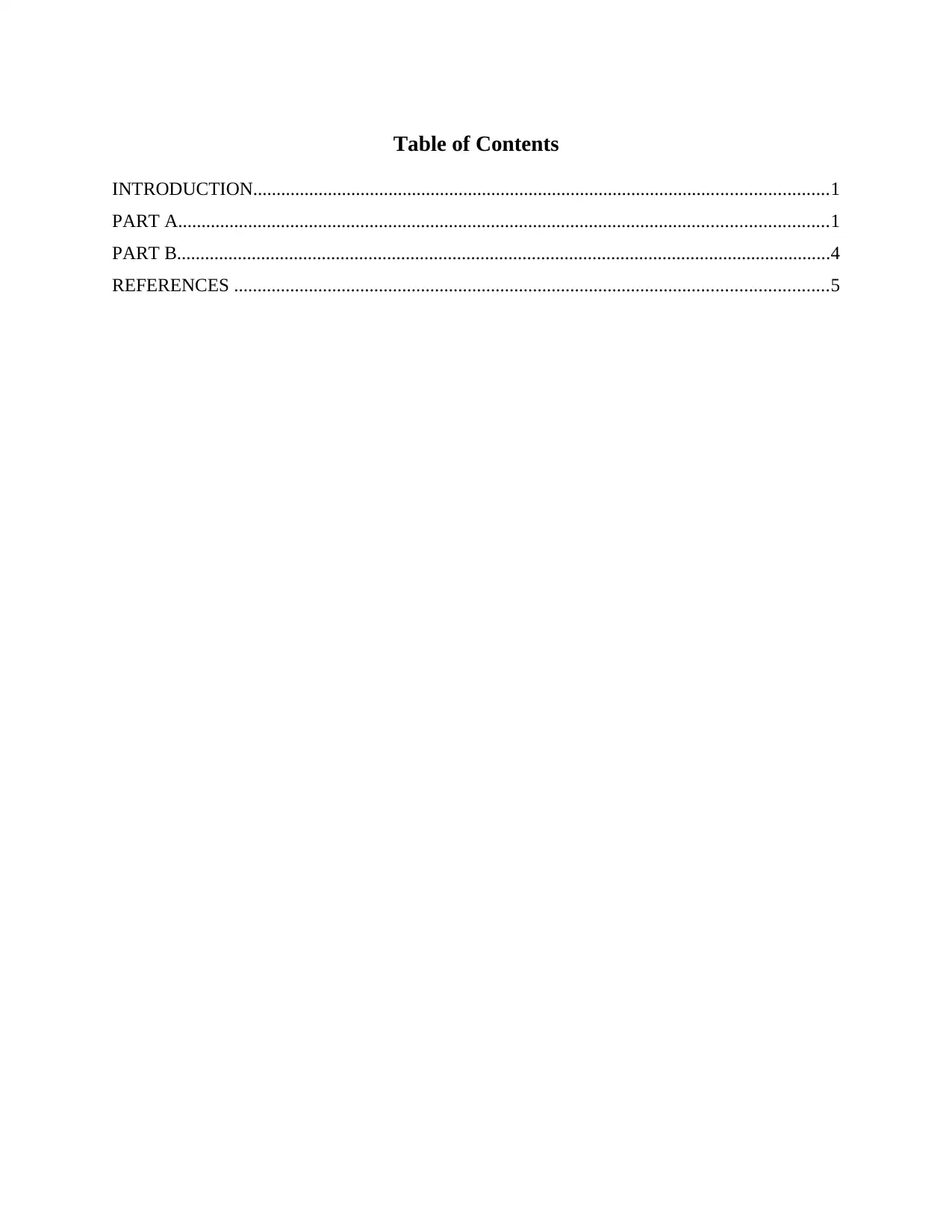
Table of Contents
INTRODUCTION...........................................................................................................................1
PART A...........................................................................................................................................1
PART B............................................................................................................................................4
REFERENCES ...............................................................................................................................5
INTRODUCTION...........................................................................................................................1
PART A...........................................................................................................................................1
PART B............................................................................................................................................4
REFERENCES ...............................................................................................................................5
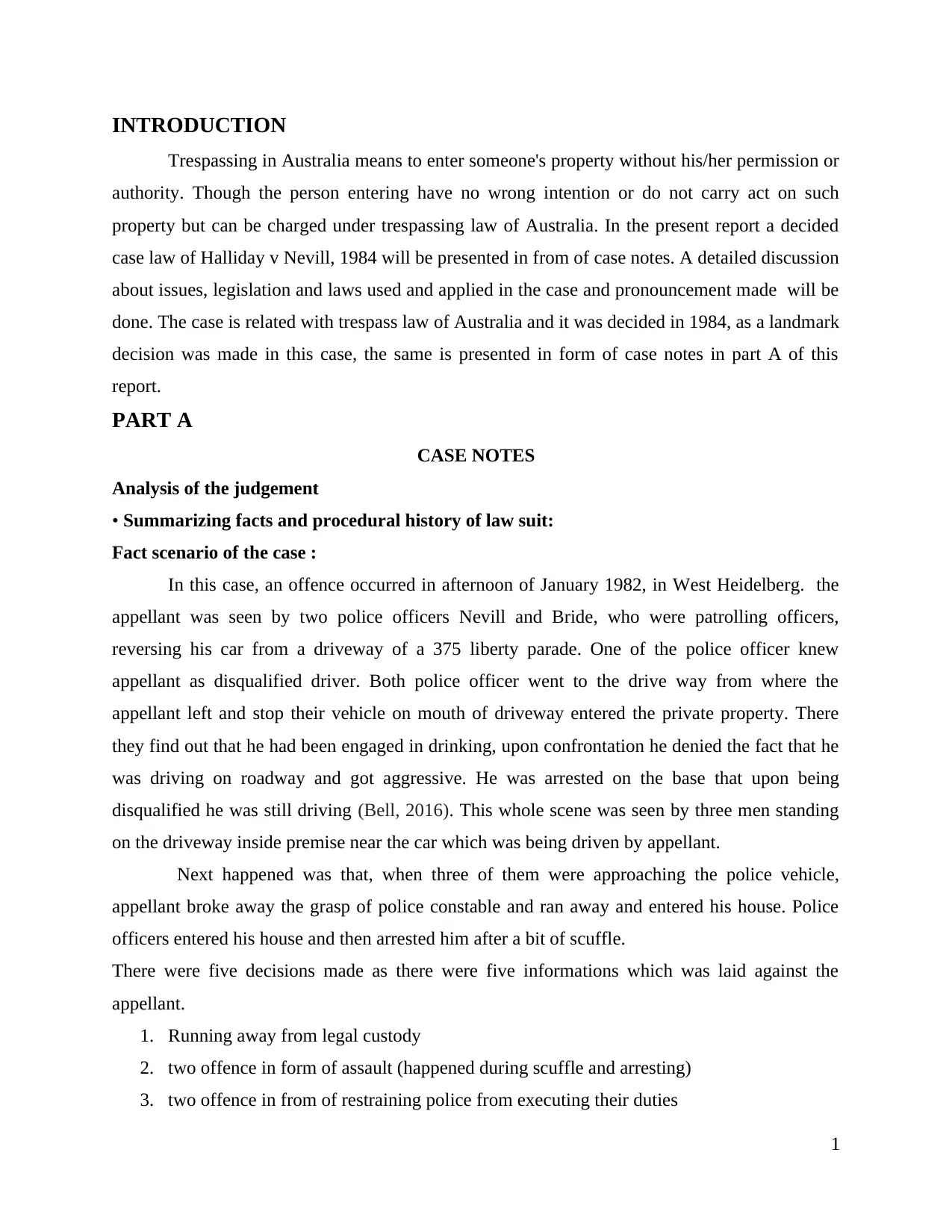
INTRODUCTION
Trespassing in Australia means to enter someone's property without his/her permission or
authority. Though the person entering have no wrong intention or do not carry act on such
property but can be charged under trespassing law of Australia. In the present report a decided
case law of Halliday v Nevill, 1984 will be presented in from of case notes. A detailed discussion
about issues, legislation and laws used and applied in the case and pronouncement made will be
done. The case is related with trespass law of Australia and it was decided in 1984, as a landmark
decision was made in this case, the same is presented in form of case notes in part A of this
report.
PART A
CASE NOTES
Analysis of the judgement
• Summarizing facts and procedural history of law suit:
Fact scenario of the case :
In this case, an offence occurred in afternoon of January 1982, in West Heidelberg. the
appellant was seen by two police officers Nevill and Bride, who were patrolling officers,
reversing his car from a driveway of a 375 liberty parade. One of the police officer knew
appellant as disqualified driver. Both police officer went to the drive way from where the
appellant left and stop their vehicle on mouth of driveway entered the private property. There
they find out that he had been engaged in drinking, upon confrontation he denied the fact that he
was driving on roadway and got aggressive. He was arrested on the base that upon being
disqualified he was still driving (Bell, 2016). This whole scene was seen by three men standing
on the driveway inside premise near the car which was being driven by appellant.
Next happened was that, when three of them were approaching the police vehicle,
appellant broke away the grasp of police constable and ran away and entered his house. Police
officers entered his house and then arrested him after a bit of scuffle.
There were five decisions made as there were five informations which was laid against the
appellant.
1. Running away from legal custody
2. two offence in form of assault (happened during scuffle and arresting)
3. two offence in from of restraining police from executing their duties
1
Trespassing in Australia means to enter someone's property without his/her permission or
authority. Though the person entering have no wrong intention or do not carry act on such
property but can be charged under trespassing law of Australia. In the present report a decided
case law of Halliday v Nevill, 1984 will be presented in from of case notes. A detailed discussion
about issues, legislation and laws used and applied in the case and pronouncement made will be
done. The case is related with trespass law of Australia and it was decided in 1984, as a landmark
decision was made in this case, the same is presented in form of case notes in part A of this
report.
PART A
CASE NOTES
Analysis of the judgement
• Summarizing facts and procedural history of law suit:
Fact scenario of the case :
In this case, an offence occurred in afternoon of January 1982, in West Heidelberg. the
appellant was seen by two police officers Nevill and Bride, who were patrolling officers,
reversing his car from a driveway of a 375 liberty parade. One of the police officer knew
appellant as disqualified driver. Both police officer went to the drive way from where the
appellant left and stop their vehicle on mouth of driveway entered the private property. There
they find out that he had been engaged in drinking, upon confrontation he denied the fact that he
was driving on roadway and got aggressive. He was arrested on the base that upon being
disqualified he was still driving (Bell, 2016). This whole scene was seen by three men standing
on the driveway inside premise near the car which was being driven by appellant.
Next happened was that, when three of them were approaching the police vehicle,
appellant broke away the grasp of police constable and ran away and entered his house. Police
officers entered his house and then arrested him after a bit of scuffle.
There were five decisions made as there were five informations which was laid against the
appellant.
1. Running away from legal custody
2. two offence in form of assault (happened during scuffle and arresting)
3. two offence in from of restraining police from executing their duties
1
⊘ This is a preview!⊘
Do you want full access?
Subscribe today to unlock all pages.

Trusted by 1+ million students worldwide
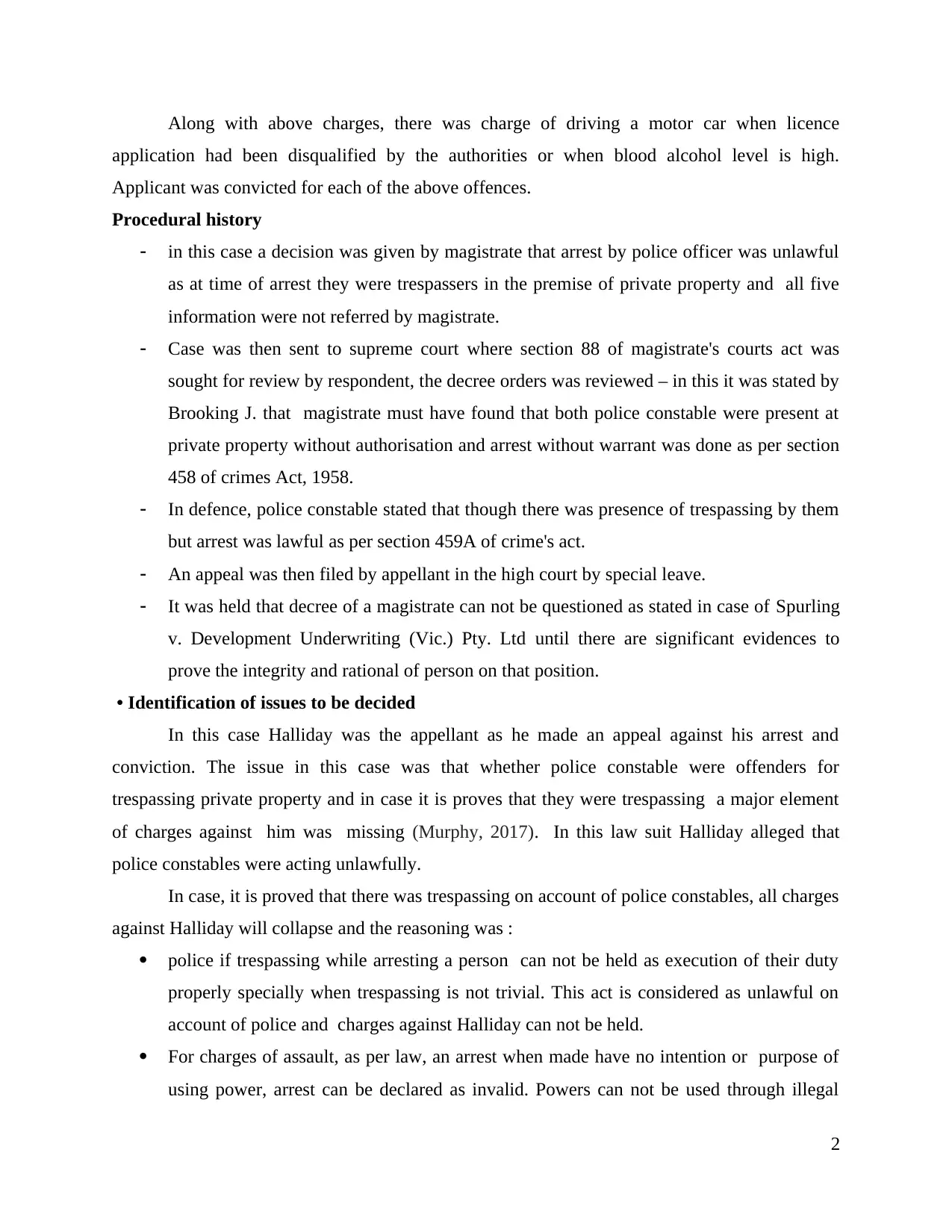
Along with above charges, there was charge of driving a motor car when licence
application had been disqualified by the authorities or when blood alcohol level is high.
Applicant was convicted for each of the above offences.
Procedural history
in this case a decision was given by magistrate that arrest by police officer was unlawful
as at time of arrest they were trespassers in the premise of private property and all five
information were not referred by magistrate.
Case was then sent to supreme court where section 88 of magistrate's courts act was
sought for review by respondent, the decree orders was reviewed – in this it was stated by
Brooking J. that magistrate must have found that both police constable were present at
private property without authorisation and arrest without warrant was done as per section
458 of crimes Act, 1958.
In defence, police constable stated that though there was presence of trespassing by them
but arrest was lawful as per section 459A of crime's act.
An appeal was then filed by appellant in the high court by special leave.
It was held that decree of a magistrate can not be questioned as stated in case of Spurling
v. Development Underwriting (Vic.) Pty. Ltd until there are significant evidences to
prove the integrity and rational of person on that position.
• Identification of issues to be decided
In this case Halliday was the appellant as he made an appeal against his arrest and
conviction. The issue in this case was that whether police constable were offenders for
trespassing private property and in case it is proves that they were trespassing a major element
of charges against him was missing (Murphy, 2017). In this law suit Halliday alleged that
police constables were acting unlawfully.
In case, it is proved that there was trespassing on account of police constables, all charges
against Halliday will collapse and the reasoning was :
police if trespassing while arresting a person can not be held as execution of their duty
properly specially when trespassing is not trivial. This act is considered as unlawful on
account of police and charges against Halliday can not be held.
For charges of assault, as per law, an arrest when made have no intention or purpose of
using power, arrest can be declared as invalid. Powers can not be used through illegal
2
application had been disqualified by the authorities or when blood alcohol level is high.
Applicant was convicted for each of the above offences.
Procedural history
in this case a decision was given by magistrate that arrest by police officer was unlawful
as at time of arrest they were trespassers in the premise of private property and all five
information were not referred by magistrate.
Case was then sent to supreme court where section 88 of magistrate's courts act was
sought for review by respondent, the decree orders was reviewed – in this it was stated by
Brooking J. that magistrate must have found that both police constable were present at
private property without authorisation and arrest without warrant was done as per section
458 of crimes Act, 1958.
In defence, police constable stated that though there was presence of trespassing by them
but arrest was lawful as per section 459A of crime's act.
An appeal was then filed by appellant in the high court by special leave.
It was held that decree of a magistrate can not be questioned as stated in case of Spurling
v. Development Underwriting (Vic.) Pty. Ltd until there are significant evidences to
prove the integrity and rational of person on that position.
• Identification of issues to be decided
In this case Halliday was the appellant as he made an appeal against his arrest and
conviction. The issue in this case was that whether police constable were offenders for
trespassing private property and in case it is proves that they were trespassing a major element
of charges against him was missing (Murphy, 2017). In this law suit Halliday alleged that
police constables were acting unlawfully.
In case, it is proved that there was trespassing on account of police constables, all charges
against Halliday will collapse and the reasoning was :
police if trespassing while arresting a person can not be held as execution of their duty
properly specially when trespassing is not trivial. This act is considered as unlawful on
account of police and charges against Halliday can not be held.
For charges of assault, as per law, an arrest when made have no intention or purpose of
using power, arrest can be declared as invalid. Powers can not be used through illegal
2
Paraphrase This Document
Need a fresh take? Get an instant paraphrase of this document with our AI Paraphraser
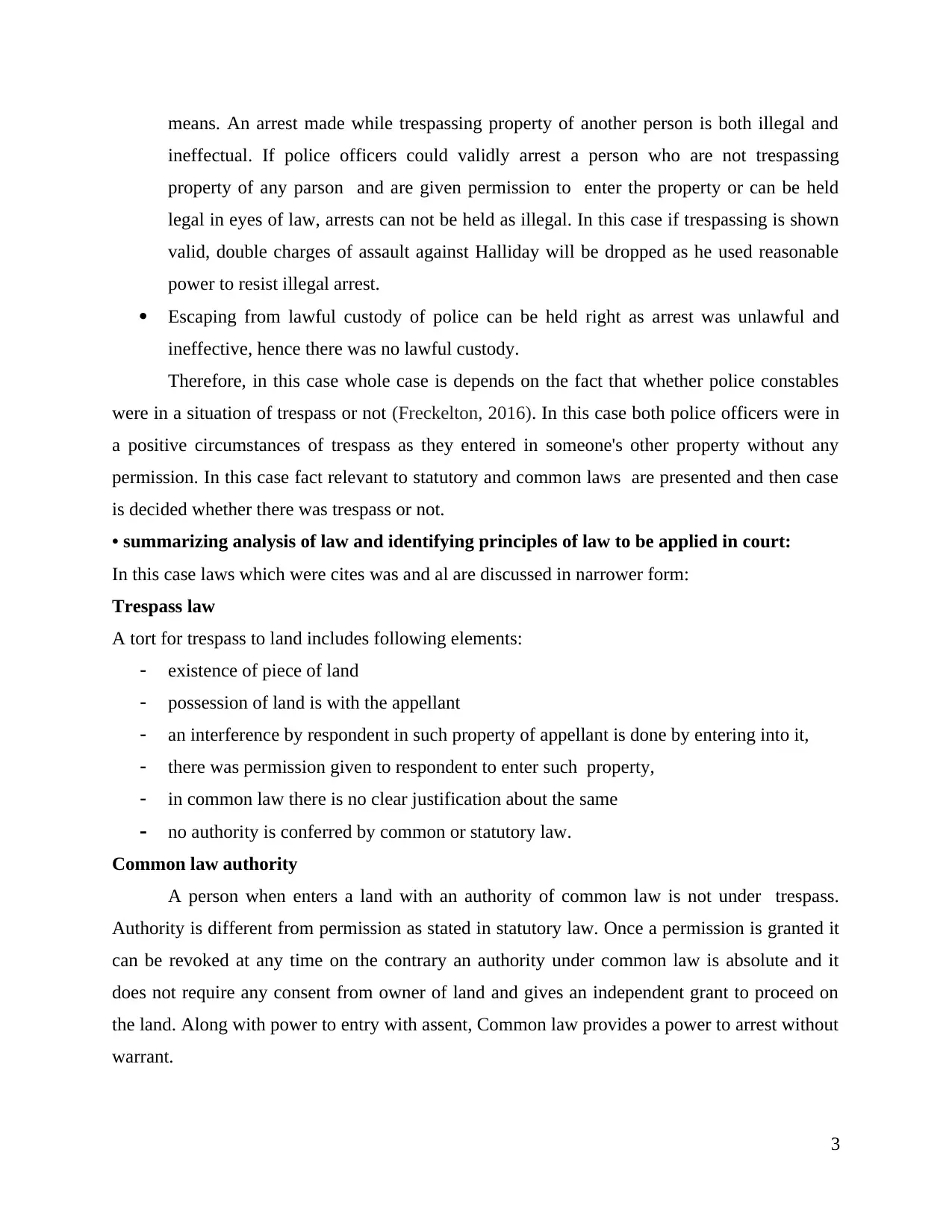
means. An arrest made while trespassing property of another person is both illegal and
ineffectual. If police officers could validly arrest a person who are not trespassing
property of any parson and are given permission to enter the property or can be held
legal in eyes of law, arrests can not be held as illegal. In this case if trespassing is shown
valid, double charges of assault against Halliday will be dropped as he used reasonable
power to resist illegal arrest.
Escaping from lawful custody of police can be held right as arrest was unlawful and
ineffective, hence there was no lawful custody.
Therefore, in this case whole case is depends on the fact that whether police constables
were in a situation of trespass or not (Freckelton, 2016). In this case both police officers were in
a positive circumstances of trespass as they entered in someone's other property without any
permission. In this case fact relevant to statutory and common laws are presented and then case
is decided whether there was trespass or not.
• summarizing analysis of law and identifying principles of law to be applied in court:
In this case laws which were cites was and al are discussed in narrower form:
Trespass law
A tort for trespass to land includes following elements:
existence of piece of land
possession of land is with the appellant
an interference by respondent in such property of appellant is done by entering into it,
there was permission given to respondent to enter such property,
in common law there is no clear justification about the same
no authority is conferred by common or statutory law.
Common law authority
A person when enters a land with an authority of common law is not under trespass.
Authority is different from permission as stated in statutory law. Once a permission is granted it
can be revoked at any time on the contrary an authority under common law is absolute and it
does not require any consent from owner of land and gives an independent grant to proceed on
the land. Along with power to entry with assent, Common law provides a power to arrest without
warrant.
3
ineffectual. If police officers could validly arrest a person who are not trespassing
property of any parson and are given permission to enter the property or can be held
legal in eyes of law, arrests can not be held as illegal. In this case if trespassing is shown
valid, double charges of assault against Halliday will be dropped as he used reasonable
power to resist illegal arrest.
Escaping from lawful custody of police can be held right as arrest was unlawful and
ineffective, hence there was no lawful custody.
Therefore, in this case whole case is depends on the fact that whether police constables
were in a situation of trespass or not (Freckelton, 2016). In this case both police officers were in
a positive circumstances of trespass as they entered in someone's other property without any
permission. In this case fact relevant to statutory and common laws are presented and then case
is decided whether there was trespass or not.
• summarizing analysis of law and identifying principles of law to be applied in court:
In this case laws which were cites was and al are discussed in narrower form:
Trespass law
A tort for trespass to land includes following elements:
existence of piece of land
possession of land is with the appellant
an interference by respondent in such property of appellant is done by entering into it,
there was permission given to respondent to enter such property,
in common law there is no clear justification about the same
no authority is conferred by common or statutory law.
Common law authority
A person when enters a land with an authority of common law is not under trespass.
Authority is different from permission as stated in statutory law. Once a permission is granted it
can be revoked at any time on the contrary an authority under common law is absolute and it
does not require any consent from owner of land and gives an independent grant to proceed on
the land. Along with power to entry with assent, Common law provides a power to arrest without
warrant.
3
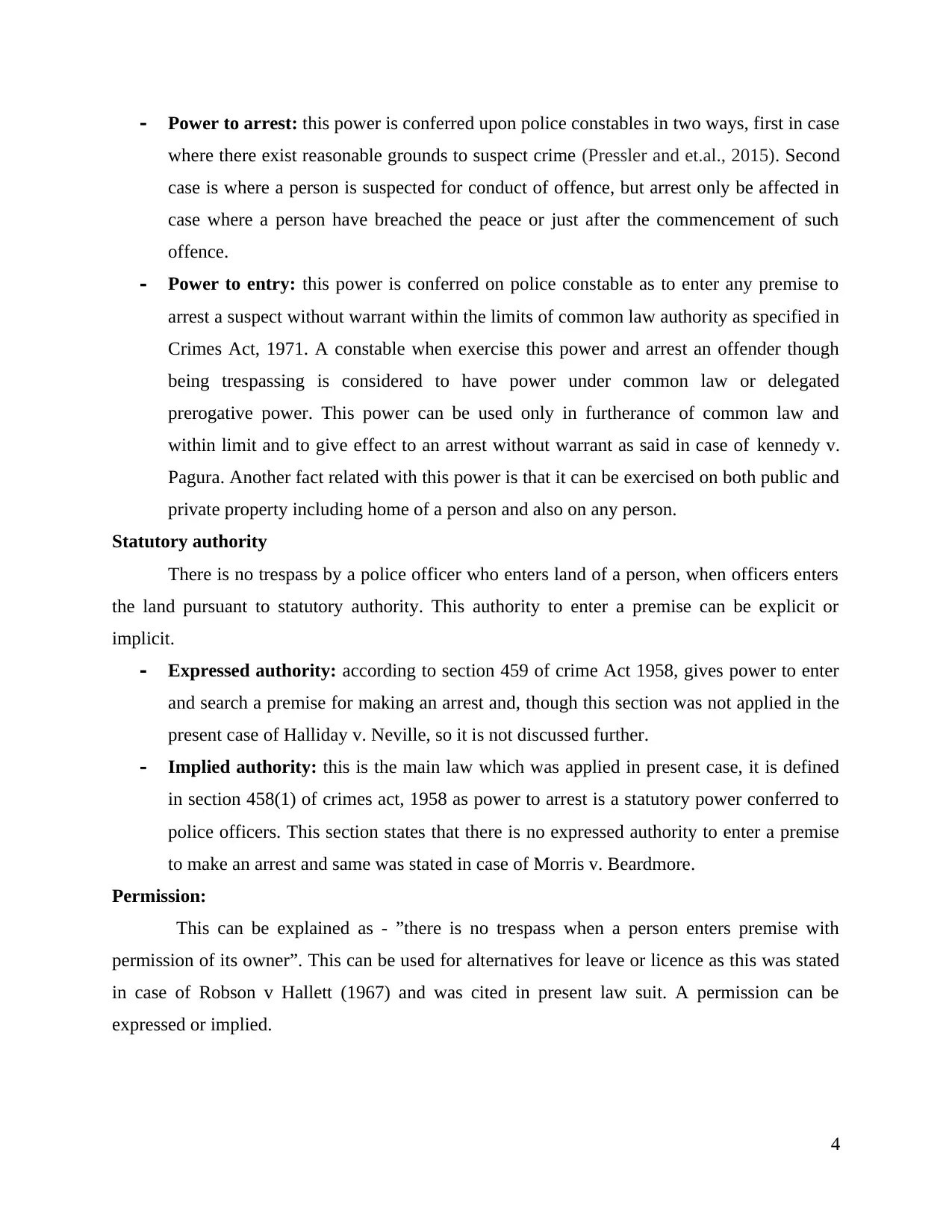
Power to arrest: this power is conferred upon police constables in two ways, first in case
where there exist reasonable grounds to suspect crime (Pressler and et.al., 2015). Second
case is where a person is suspected for conduct of offence, but arrest only be affected in
case where a person have breached the peace or just after the commencement of such
offence.
Power to entry: this power is conferred on police constable as to enter any premise to
arrest a suspect without warrant within the limits of common law authority as specified in
Crimes Act, 1971. A constable when exercise this power and arrest an offender though
being trespassing is considered to have power under common law or delegated
prerogative power. This power can be used only in furtherance of common law and
within limit and to give effect to an arrest without warrant as said in case of kennedy v.
Pagura. Another fact related with this power is that it can be exercised on both public and
private property including home of a person and also on any person.
Statutory authority
There is no trespass by a police officer who enters land of a person, when officers enters
the land pursuant to statutory authority. This authority to enter a premise can be explicit or
implicit.
Expressed authority: according to section 459 of crime Act 1958, gives power to enter
and search a premise for making an arrest and, though this section was not applied in the
present case of Halliday v. Neville, so it is not discussed further.
Implied authority: this is the main law which was applied in present case, it is defined
in section 458(1) of crimes act, 1958 as power to arrest is a statutory power conferred to
police officers. This section states that there is no expressed authority to enter a premise
to make an arrest and same was stated in case of Morris v. Beardmore.
Permission:
This can be explained as - ”there is no trespass when a person enters premise with
permission of its owner”. This can be used for alternatives for leave or licence as this was stated
in case of Robson v Hallett (1967) and was cited in present law suit. A permission can be
expressed or implied.
4
where there exist reasonable grounds to suspect crime (Pressler and et.al., 2015). Second
case is where a person is suspected for conduct of offence, but arrest only be affected in
case where a person have breached the peace or just after the commencement of such
offence.
Power to entry: this power is conferred on police constable as to enter any premise to
arrest a suspect without warrant within the limits of common law authority as specified in
Crimes Act, 1971. A constable when exercise this power and arrest an offender though
being trespassing is considered to have power under common law or delegated
prerogative power. This power can be used only in furtherance of common law and
within limit and to give effect to an arrest without warrant as said in case of kennedy v.
Pagura. Another fact related with this power is that it can be exercised on both public and
private property including home of a person and also on any person.
Statutory authority
There is no trespass by a police officer who enters land of a person, when officers enters
the land pursuant to statutory authority. This authority to enter a premise can be explicit or
implicit.
Expressed authority: according to section 459 of crime Act 1958, gives power to enter
and search a premise for making an arrest and, though this section was not applied in the
present case of Halliday v. Neville, so it is not discussed further.
Implied authority: this is the main law which was applied in present case, it is defined
in section 458(1) of crimes act, 1958 as power to arrest is a statutory power conferred to
police officers. This section states that there is no expressed authority to enter a premise
to make an arrest and same was stated in case of Morris v. Beardmore.
Permission:
This can be explained as - ”there is no trespass when a person enters premise with
permission of its owner”. This can be used for alternatives for leave or licence as this was stated
in case of Robson v Hallett (1967) and was cited in present law suit. A permission can be
expressed or implied.
4
⊘ This is a preview!⊘
Do you want full access?
Subscribe today to unlock all pages.

Trusted by 1+ million students worldwide
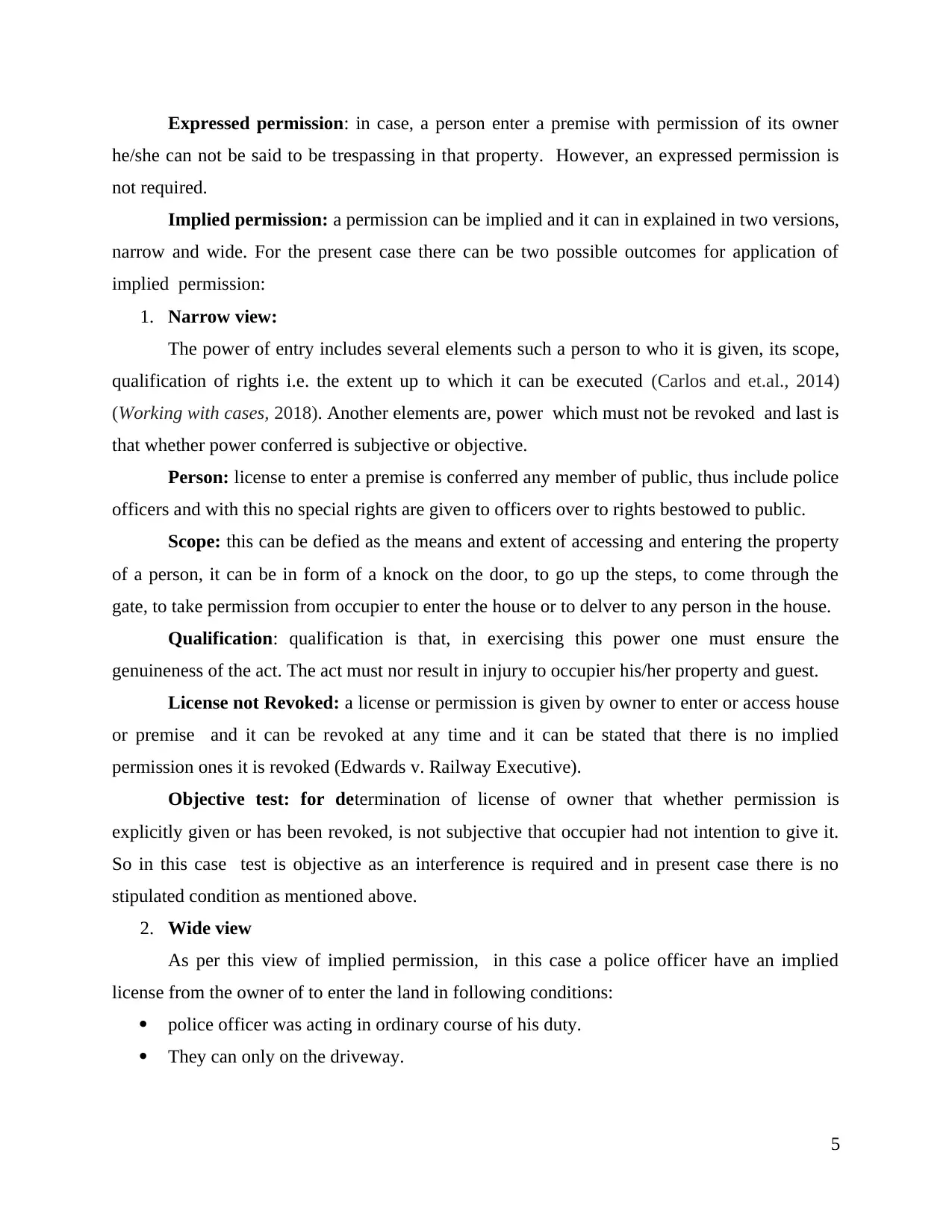
Expressed permission: in case, a person enter a premise with permission of its owner
he/she can not be said to be trespassing in that property. However, an expressed permission is
not required.
Implied permission: a permission can be implied and it can in explained in two versions,
narrow and wide. For the present case there can be two possible outcomes for application of
implied permission:
1. Narrow view:
The power of entry includes several elements such a person to who it is given, its scope,
qualification of rights i.e. the extent up to which it can be executed (Carlos and et.al., 2014)
(Working with cases, 2018). Another elements are, power which must not be revoked and last is
that whether power conferred is subjective or objective.
Person: license to enter a premise is conferred any member of public, thus include police
officers and with this no special rights are given to officers over to rights bestowed to public.
Scope: this can be defied as the means and extent of accessing and entering the property
of a person, it can be in form of a knock on the door, to go up the steps, to come through the
gate, to take permission from occupier to enter the house or to delver to any person in the house.
Qualification: qualification is that, in exercising this power one must ensure the
genuineness of the act. The act must nor result in injury to occupier his/her property and guest.
License not Revoked: a license or permission is given by owner to enter or access house
or premise and it can be revoked at any time and it can be stated that there is no implied
permission ones it is revoked (Edwards v. Railway Executive).
Objective test: for determination of license of owner that whether permission is
explicitly given or has been revoked, is not subjective that occupier had not intention to give it.
So in this case test is objective as an interference is required and in present case there is no
stipulated condition as mentioned above.
2. Wide view
As per this view of implied permission, in this case a police officer have an implied
license from the owner of to enter the land in following conditions:
police officer was acting in ordinary course of his duty.
They can only on the driveway.
5
he/she can not be said to be trespassing in that property. However, an expressed permission is
not required.
Implied permission: a permission can be implied and it can in explained in two versions,
narrow and wide. For the present case there can be two possible outcomes for application of
implied permission:
1. Narrow view:
The power of entry includes several elements such a person to who it is given, its scope,
qualification of rights i.e. the extent up to which it can be executed (Carlos and et.al., 2014)
(Working with cases, 2018). Another elements are, power which must not be revoked and last is
that whether power conferred is subjective or objective.
Person: license to enter a premise is conferred any member of public, thus include police
officers and with this no special rights are given to officers over to rights bestowed to public.
Scope: this can be defied as the means and extent of accessing and entering the property
of a person, it can be in form of a knock on the door, to go up the steps, to come through the
gate, to take permission from occupier to enter the house or to delver to any person in the house.
Qualification: qualification is that, in exercising this power one must ensure the
genuineness of the act. The act must nor result in injury to occupier his/her property and guest.
License not Revoked: a license or permission is given by owner to enter or access house
or premise and it can be revoked at any time and it can be stated that there is no implied
permission ones it is revoked (Edwards v. Railway Executive).
Objective test: for determination of license of owner that whether permission is
explicitly given or has been revoked, is not subjective that occupier had not intention to give it.
So in this case test is objective as an interference is required and in present case there is no
stipulated condition as mentioned above.
2. Wide view
As per this view of implied permission, in this case a police officer have an implied
license from the owner of to enter the land in following conditions:
police officer was acting in ordinary course of his duty.
They can only on the driveway.
5
Paraphrase This Document
Need a fresh take? Get an instant paraphrase of this document with our AI Paraphraser
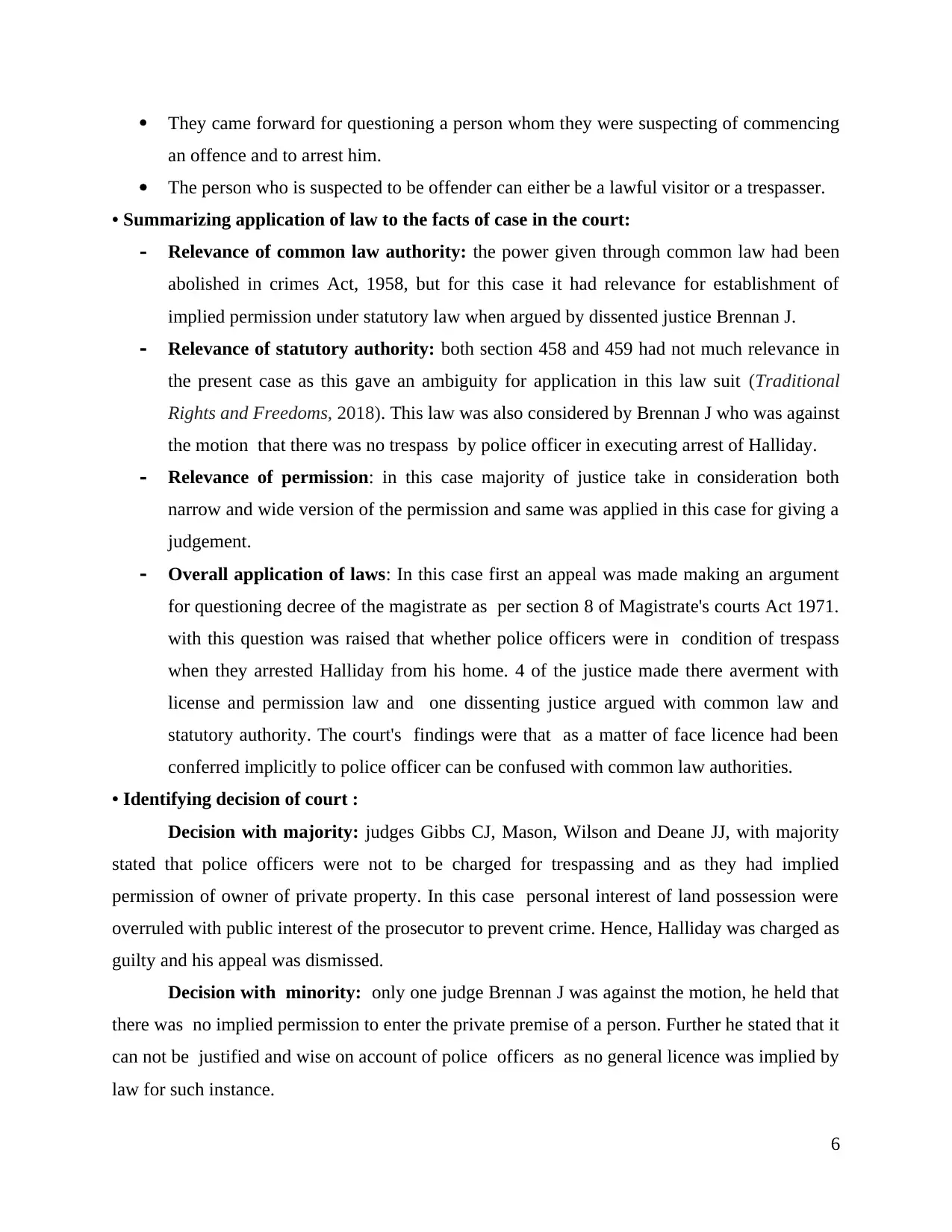
They came forward for questioning a person whom they were suspecting of commencing
an offence and to arrest him.
The person who is suspected to be offender can either be a lawful visitor or a trespasser.
• Summarizing application of law to the facts of case in the court:
Relevance of common law authority: the power given through common law had been
abolished in crimes Act, 1958, but for this case it had relevance for establishment of
implied permission under statutory law when argued by dissented justice Brennan J.
Relevance of statutory authority: both section 458 and 459 had not much relevance in
the present case as this gave an ambiguity for application in this law suit (Traditional
Rights and Freedoms, 2018). This law was also considered by Brennan J who was against
the motion that there was no trespass by police officer in executing arrest of Halliday.
Relevance of permission: in this case majority of justice take in consideration both
narrow and wide version of the permission and same was applied in this case for giving a
judgement.
Overall application of laws: In this case first an appeal was made making an argument
for questioning decree of the magistrate as per section 8 of Magistrate's courts Act 1971.
with this question was raised that whether police officers were in condition of trespass
when they arrested Halliday from his home. 4 of the justice made there averment with
license and permission law and one dissenting justice argued with common law and
statutory authority. The court's findings were that as a matter of face licence had been
conferred implicitly to police officer can be confused with common law authorities.
• Identifying decision of court :
Decision with majority: judges Gibbs CJ, Mason, Wilson and Deane JJ, with majority
stated that police officers were not to be charged for trespassing and as they had implied
permission of owner of private property. In this case personal interest of land possession were
overruled with public interest of the prosecutor to prevent crime. Hence, Halliday was charged as
guilty and his appeal was dismissed.
Decision with minority: only one judge Brennan J was against the motion, he held that
there was no implied permission to enter the private premise of a person. Further he stated that it
can not be justified and wise on account of police officers as no general licence was implied by
law for such instance.
6
an offence and to arrest him.
The person who is suspected to be offender can either be a lawful visitor or a trespasser.
• Summarizing application of law to the facts of case in the court:
Relevance of common law authority: the power given through common law had been
abolished in crimes Act, 1958, but for this case it had relevance for establishment of
implied permission under statutory law when argued by dissented justice Brennan J.
Relevance of statutory authority: both section 458 and 459 had not much relevance in
the present case as this gave an ambiguity for application in this law suit (Traditional
Rights and Freedoms, 2018). This law was also considered by Brennan J who was against
the motion that there was no trespass by police officer in executing arrest of Halliday.
Relevance of permission: in this case majority of justice take in consideration both
narrow and wide version of the permission and same was applied in this case for giving a
judgement.
Overall application of laws: In this case first an appeal was made making an argument
for questioning decree of the magistrate as per section 8 of Magistrate's courts Act 1971.
with this question was raised that whether police officers were in condition of trespass
when they arrested Halliday from his home. 4 of the justice made there averment with
license and permission law and one dissenting justice argued with common law and
statutory authority. The court's findings were that as a matter of face licence had been
conferred implicitly to police officer can be confused with common law authorities.
• Identifying decision of court :
Decision with majority: judges Gibbs CJ, Mason, Wilson and Deane JJ, with majority
stated that police officers were not to be charged for trespassing and as they had implied
permission of owner of private property. In this case personal interest of land possession were
overruled with public interest of the prosecutor to prevent crime. Hence, Halliday was charged as
guilty and his appeal was dismissed.
Decision with minority: only one judge Brennan J was against the motion, he held that
there was no implied permission to enter the private premise of a person. Further he stated that it
can not be justified and wise on account of police officers as no general licence was implied by
law for such instance.
6
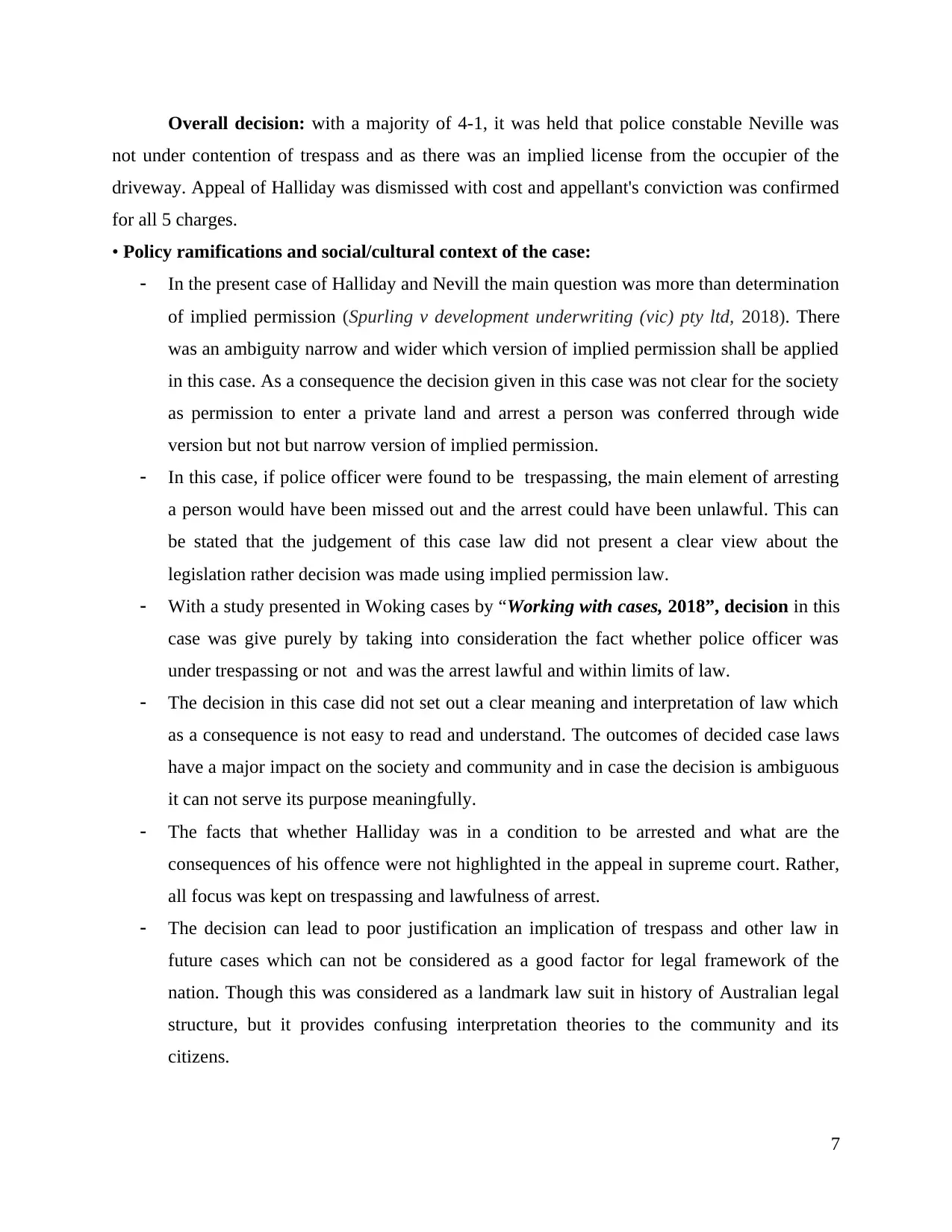
Overall decision: with a majority of 4-1, it was held that police constable Neville was
not under contention of trespass and as there was an implied license from the occupier of the
driveway. Appeal of Halliday was dismissed with cost and appellant's conviction was confirmed
for all 5 charges.
• Policy ramifications and social/cultural context of the case:
In the present case of Halliday and Nevill the main question was more than determination
of implied permission (Spurling v development underwriting (vic) pty ltd, 2018). There
was an ambiguity narrow and wider which version of implied permission shall be applied
in this case. As a consequence the decision given in this case was not clear for the society
as permission to enter a private land and arrest a person was conferred through wide
version but not but narrow version of implied permission.
In this case, if police officer were found to be trespassing, the main element of arresting
a person would have been missed out and the arrest could have been unlawful. This can
be stated that the judgement of this case law did not present a clear view about the
legislation rather decision was made using implied permission law.
With a study presented in Woking cases by “Working with cases, 2018”, decision in this
case was give purely by taking into consideration the fact whether police officer was
under trespassing or not and was the arrest lawful and within limits of law.
The decision in this case did not set out a clear meaning and interpretation of law which
as a consequence is not easy to read and understand. The outcomes of decided case laws
have a major impact on the society and community and in case the decision is ambiguous
it can not serve its purpose meaningfully.
The facts that whether Halliday was in a condition to be arrested and what are the
consequences of his offence were not highlighted in the appeal in supreme court. Rather,
all focus was kept on trespassing and lawfulness of arrest.
The decision can lead to poor justification an implication of trespass and other law in
future cases which can not be considered as a good factor for legal framework of the
nation. Though this was considered as a landmark law suit in history of Australian legal
structure, but it provides confusing interpretation theories to the community and its
citizens.
7
not under contention of trespass and as there was an implied license from the occupier of the
driveway. Appeal of Halliday was dismissed with cost and appellant's conviction was confirmed
for all 5 charges.
• Policy ramifications and social/cultural context of the case:
In the present case of Halliday and Nevill the main question was more than determination
of implied permission (Spurling v development underwriting (vic) pty ltd, 2018). There
was an ambiguity narrow and wider which version of implied permission shall be applied
in this case. As a consequence the decision given in this case was not clear for the society
as permission to enter a private land and arrest a person was conferred through wide
version but not but narrow version of implied permission.
In this case, if police officer were found to be trespassing, the main element of arresting
a person would have been missed out and the arrest could have been unlawful. This can
be stated that the judgement of this case law did not present a clear view about the
legislation rather decision was made using implied permission law.
With a study presented in Woking cases by “Working with cases, 2018”, decision in this
case was give purely by taking into consideration the fact whether police officer was
under trespassing or not and was the arrest lawful and within limits of law.
The decision in this case did not set out a clear meaning and interpretation of law which
as a consequence is not easy to read and understand. The outcomes of decided case laws
have a major impact on the society and community and in case the decision is ambiguous
it can not serve its purpose meaningfully.
The facts that whether Halliday was in a condition to be arrested and what are the
consequences of his offence were not highlighted in the appeal in supreme court. Rather,
all focus was kept on trespassing and lawfulness of arrest.
The decision can lead to poor justification an implication of trespass and other law in
future cases which can not be considered as a good factor for legal framework of the
nation. Though this was considered as a landmark law suit in history of Australian legal
structure, but it provides confusing interpretation theories to the community and its
citizens.
7
⊘ This is a preview!⊘
Do you want full access?
Subscribe today to unlock all pages.

Trusted by 1+ million students worldwide
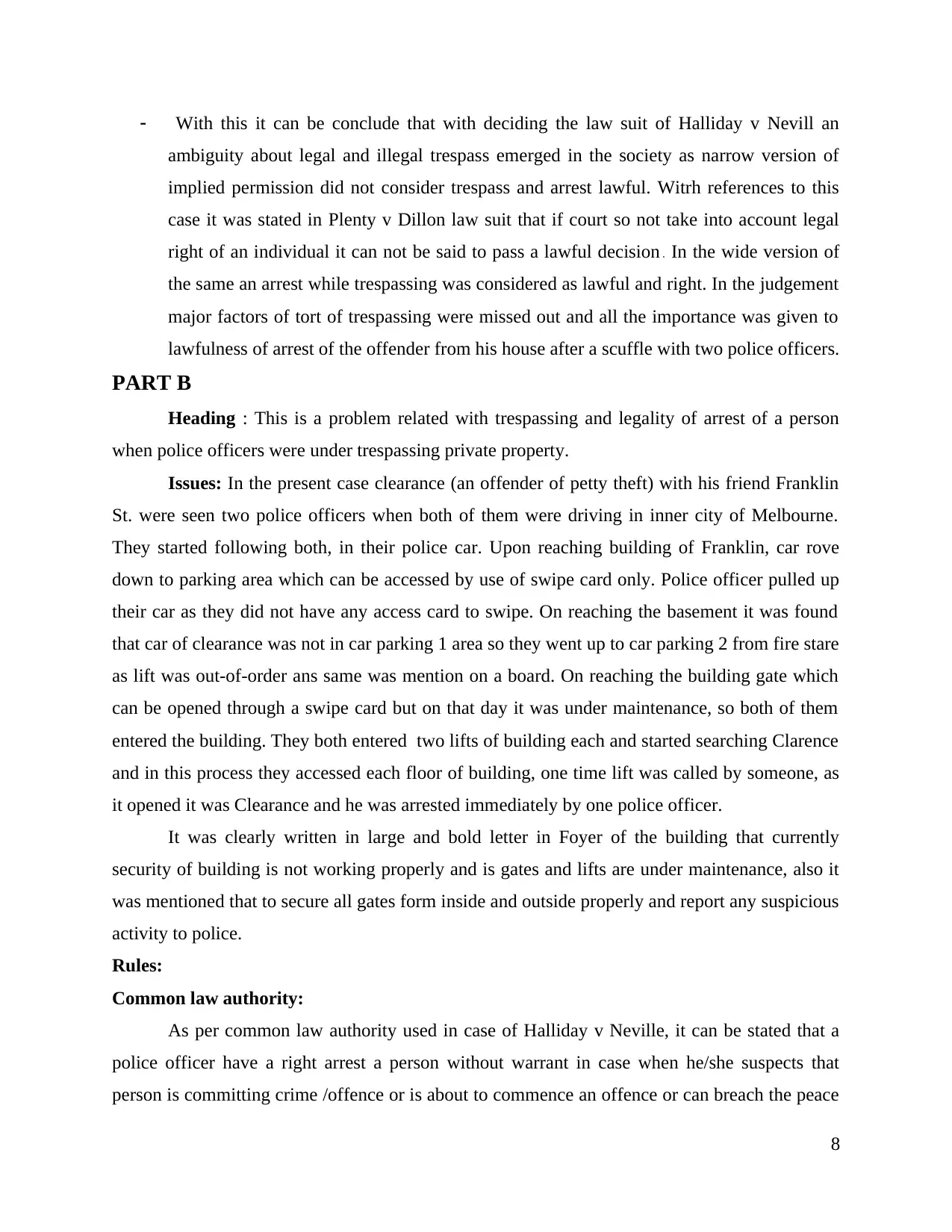
With this it can be conclude that with deciding the law suit of Halliday v Nevill an
ambiguity about legal and illegal trespass emerged in the society as narrow version of
implied permission did not consider trespass and arrest lawful. Witrh references to this
case it was stated in Plenty v Dillon law suit that if court so not take into account legal
right of an individual it can not be said to pass a lawful decision. In the wide version of
the same an arrest while trespassing was considered as lawful and right. In the judgement
major factors of tort of trespassing were missed out and all the importance was given to
lawfulness of arrest of the offender from his house after a scuffle with two police officers.
PART B
Heading : This is a problem related with trespassing and legality of arrest of a person
when police officers were under trespassing private property.
Issues: In the present case clearance (an offender of petty theft) with his friend Franklin
St. were seen two police officers when both of them were driving in inner city of Melbourne.
They started following both, in their police car. Upon reaching building of Franklin, car rove
down to parking area which can be accessed by use of swipe card only. Police officer pulled up
their car as they did not have any access card to swipe. On reaching the basement it was found
that car of clearance was not in car parking 1 area so they went up to car parking 2 from fire stare
as lift was out-of-order ans same was mention on a board. On reaching the building gate which
can be opened through a swipe card but on that day it was under maintenance, so both of them
entered the building. They both entered two lifts of building each and started searching Clarence
and in this process they accessed each floor of building, one time lift was called by someone, as
it opened it was Clearance and he was arrested immediately by one police officer.
It was clearly written in large and bold letter in Foyer of the building that currently
security of building is not working properly and is gates and lifts are under maintenance, also it
was mentioned that to secure all gates form inside and outside properly and report any suspicious
activity to police.
Rules:
Common law authority:
As per common law authority used in case of Halliday v Neville, it can be stated that a
police officer have a right arrest a person without warrant in case when he/she suspects that
person is committing crime /offence or is about to commence an offence or can breach the peace
8
ambiguity about legal and illegal trespass emerged in the society as narrow version of
implied permission did not consider trespass and arrest lawful. Witrh references to this
case it was stated in Plenty v Dillon law suit that if court so not take into account legal
right of an individual it can not be said to pass a lawful decision. In the wide version of
the same an arrest while trespassing was considered as lawful and right. In the judgement
major factors of tort of trespassing were missed out and all the importance was given to
lawfulness of arrest of the offender from his house after a scuffle with two police officers.
PART B
Heading : This is a problem related with trespassing and legality of arrest of a person
when police officers were under trespassing private property.
Issues: In the present case clearance (an offender of petty theft) with his friend Franklin
St. were seen two police officers when both of them were driving in inner city of Melbourne.
They started following both, in their police car. Upon reaching building of Franklin, car rove
down to parking area which can be accessed by use of swipe card only. Police officer pulled up
their car as they did not have any access card to swipe. On reaching the basement it was found
that car of clearance was not in car parking 1 area so they went up to car parking 2 from fire stare
as lift was out-of-order ans same was mention on a board. On reaching the building gate which
can be opened through a swipe card but on that day it was under maintenance, so both of them
entered the building. They both entered two lifts of building each and started searching Clarence
and in this process they accessed each floor of building, one time lift was called by someone, as
it opened it was Clearance and he was arrested immediately by one police officer.
It was clearly written in large and bold letter in Foyer of the building that currently
security of building is not working properly and is gates and lifts are under maintenance, also it
was mentioned that to secure all gates form inside and outside properly and report any suspicious
activity to police.
Rules:
Common law authority:
As per common law authority used in case of Halliday v Neville, it can be stated that a
police officer have a right arrest a person without warrant in case when he/she suspects that
person is committing crime /offence or is about to commence an offence or can breach the peace
8
Paraphrase This Document
Need a fresh take? Get an instant paraphrase of this document with our AI Paraphraser
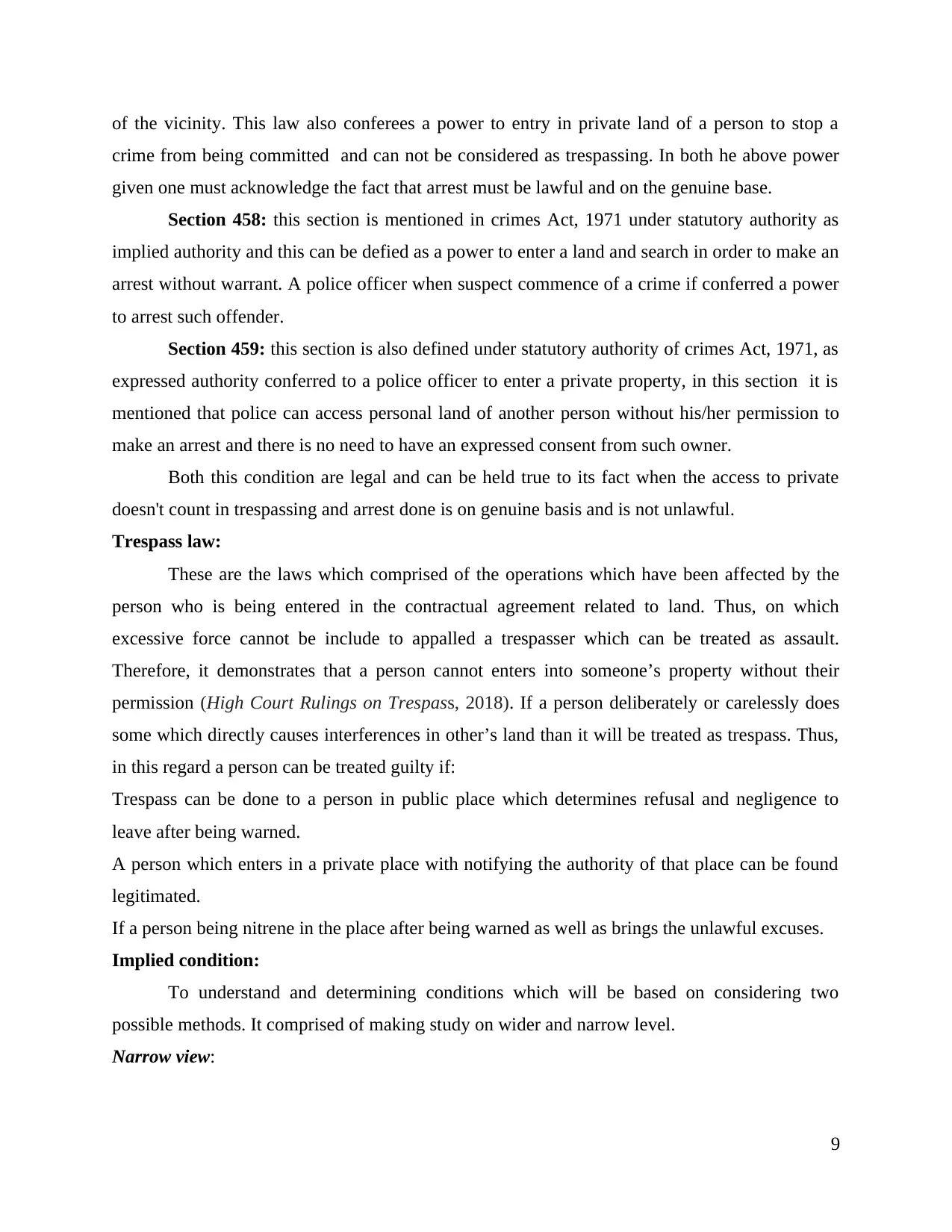
of the vicinity. This law also conferees a power to entry in private land of a person to stop a
crime from being committed and can not be considered as trespassing. In both he above power
given one must acknowledge the fact that arrest must be lawful and on the genuine base.
Section 458: this section is mentioned in crimes Act, 1971 under statutory authority as
implied authority and this can be defied as a power to enter a land and search in order to make an
arrest without warrant. A police officer when suspect commence of a crime if conferred a power
to arrest such offender.
Section 459: this section is also defined under statutory authority of crimes Act, 1971, as
expressed authority conferred to a police officer to enter a private property, in this section it is
mentioned that police can access personal land of another person without his/her permission to
make an arrest and there is no need to have an expressed consent from such owner.
Both this condition are legal and can be held true to its fact when the access to private
doesn't count in trespassing and arrest done is on genuine basis and is not unlawful.
Trespass law:
These are the laws which comprised of the operations which have been affected by the
person who is being entered in the contractual agreement related to land. Thus, on which
excessive force cannot be include to appalled a trespasser which can be treated as assault.
Therefore, it demonstrates that a person cannot enters into someone’s property without their
permission (High Court Rulings on Trespass, 2018). If a person deliberately or carelessly does
some which directly causes interferences in other’s land than it will be treated as trespass. Thus,
in this regard a person can be treated guilty if:
Trespass can be done to a person in public place which determines refusal and negligence to
leave after being warned.
A person which enters in a private place with notifying the authority of that place can be found
legitimated.
If a person being nitrene in the place after being warned as well as brings the unlawful excuses.
Implied condition:
To understand and determining conditions which will be based on considering two
possible methods. It comprised of making study on wider and narrow level.
Narrow view:
9
crime from being committed and can not be considered as trespassing. In both he above power
given one must acknowledge the fact that arrest must be lawful and on the genuine base.
Section 458: this section is mentioned in crimes Act, 1971 under statutory authority as
implied authority and this can be defied as a power to enter a land and search in order to make an
arrest without warrant. A police officer when suspect commence of a crime if conferred a power
to arrest such offender.
Section 459: this section is also defined under statutory authority of crimes Act, 1971, as
expressed authority conferred to a police officer to enter a private property, in this section it is
mentioned that police can access personal land of another person without his/her permission to
make an arrest and there is no need to have an expressed consent from such owner.
Both this condition are legal and can be held true to its fact when the access to private
doesn't count in trespassing and arrest done is on genuine basis and is not unlawful.
Trespass law:
These are the laws which comprised of the operations which have been affected by the
person who is being entered in the contractual agreement related to land. Thus, on which
excessive force cannot be include to appalled a trespasser which can be treated as assault.
Therefore, it demonstrates that a person cannot enters into someone’s property without their
permission (High Court Rulings on Trespass, 2018). If a person deliberately or carelessly does
some which directly causes interferences in other’s land than it will be treated as trespass. Thus,
in this regard a person can be treated guilty if:
Trespass can be done to a person in public place which determines refusal and negligence to
leave after being warned.
A person which enters in a private place with notifying the authority of that place can be found
legitimated.
If a person being nitrene in the place after being warned as well as brings the unlawful excuses.
Implied condition:
To understand and determining conditions which will be based on considering two
possible methods. It comprised of making study on wider and narrow level.
Narrow view:
9
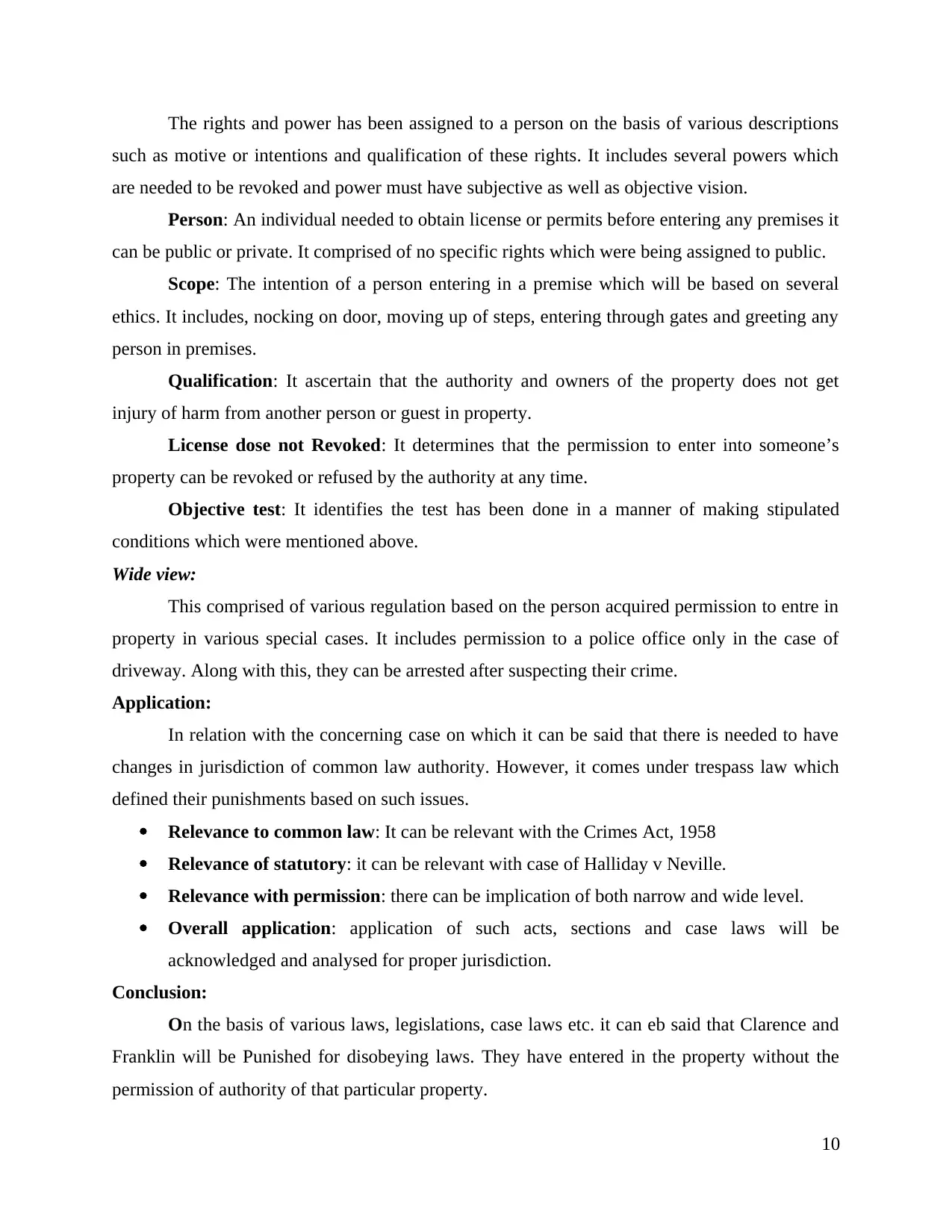
The rights and power has been assigned to a person on the basis of various descriptions
such as motive or intentions and qualification of these rights. It includes several powers which
are needed to be revoked and power must have subjective as well as objective vision.
Person: An individual needed to obtain license or permits before entering any premises it
can be public or private. It comprised of no specific rights which were being assigned to public.
Scope: The intention of a person entering in a premise which will be based on several
ethics. It includes, nocking on door, moving up of steps, entering through gates and greeting any
person in premises.
Qualification: It ascertain that the authority and owners of the property does not get
injury of harm from another person or guest in property.
License dose not Revoked: It determines that the permission to enter into someone’s
property can be revoked or refused by the authority at any time.
Objective test: It identifies the test has been done in a manner of making stipulated
conditions which were mentioned above.
Wide view:
This comprised of various regulation based on the person acquired permission to entre in
property in various special cases. It includes permission to a police office only in the case of
driveway. Along with this, they can be arrested after suspecting their crime.
Application:
In relation with the concerning case on which it can be said that there is needed to have
changes in jurisdiction of common law authority. However, it comes under trespass law which
defined their punishments based on such issues.
Relevance to common law: It can be relevant with the Crimes Act, 1958
Relevance of statutory: it can be relevant with case of Halliday v Neville.
Relevance with permission: there can be implication of both narrow and wide level.
Overall application: application of such acts, sections and case laws will be
acknowledged and analysed for proper jurisdiction.
Conclusion:
On the basis of various laws, legislations, case laws etc. it can eb said that Clarence and
Franklin will be Punished for disobeying laws. They have entered in the property without the
permission of authority of that particular property.
10
such as motive or intentions and qualification of these rights. It includes several powers which
are needed to be revoked and power must have subjective as well as objective vision.
Person: An individual needed to obtain license or permits before entering any premises it
can be public or private. It comprised of no specific rights which were being assigned to public.
Scope: The intention of a person entering in a premise which will be based on several
ethics. It includes, nocking on door, moving up of steps, entering through gates and greeting any
person in premises.
Qualification: It ascertain that the authority and owners of the property does not get
injury of harm from another person or guest in property.
License dose not Revoked: It determines that the permission to enter into someone’s
property can be revoked or refused by the authority at any time.
Objective test: It identifies the test has been done in a manner of making stipulated
conditions which were mentioned above.
Wide view:
This comprised of various regulation based on the person acquired permission to entre in
property in various special cases. It includes permission to a police office only in the case of
driveway. Along with this, they can be arrested after suspecting their crime.
Application:
In relation with the concerning case on which it can be said that there is needed to have
changes in jurisdiction of common law authority. However, it comes under trespass law which
defined their punishments based on such issues.
Relevance to common law: It can be relevant with the Crimes Act, 1958
Relevance of statutory: it can be relevant with case of Halliday v Neville.
Relevance with permission: there can be implication of both narrow and wide level.
Overall application: application of such acts, sections and case laws will be
acknowledged and analysed for proper jurisdiction.
Conclusion:
On the basis of various laws, legislations, case laws etc. it can eb said that Clarence and
Franklin will be Punished for disobeying laws. They have entered in the property without the
permission of authority of that particular property.
10
⊘ This is a preview!⊘
Do you want full access?
Subscribe today to unlock all pages.

Trusted by 1+ million students worldwide
1 out of 15
Your All-in-One AI-Powered Toolkit for Academic Success.
+13062052269
info@desklib.com
Available 24*7 on WhatsApp / Email
![[object Object]](/_next/static/media/star-bottom.7253800d.svg)
Unlock your academic potential
Copyright © 2020–2025 A2Z Services. All Rights Reserved. Developed and managed by ZUCOL.

![Hackshaw v. Shaw [1984] 155 CLR 614: A Detailed Case Analysis](/_next/image/?url=https%3A%2F%2Fdesklib.com%2Fmedia%2Fimages%2Fwz%2F78dce05f3ebb44cf94685032c9503309.jpg&w=256&q=75)
